Peter Hotez Sees Aggression Everywhere But In The Mirror
Patrolling scientific discourse, Hotez has a knack for discovering "antiscience" in anyone who disagrees with him.
8 minute read
Jeffrey Sachs, economics professor at Columbia University and chair of an international commission on COVID-19, charged in a wide-ranging interview last week that the National Institutes of Health and allied scientists were impeding an investigation into how the COVID-19 pandemic started. Since the pandemic’s beginning, virologists have been attacking anyone who asks hard questions about what might have started this outbreak.
Predictably, Baylor School of Medicine’s Peter Hotez went on the assault, tweeting that Sachs, as leader of the Lancet Commission, did not represent the views of science. Much like a Pentagon general wrapping himself in freedom and the flag to demand more federal monies for another foreign war—no questions, you anti-war hippie!—Hotez has been shrouding himself in the mantle of science to denigrate anyone who questions taxpayer funding for dangerous virus research by the National Institutes of Health.
Unfortunately for Sachs, he is just Hotez’s latest target.
Sachs angered Hotez by shutting down a corrupt task force
Shortly after the outbreak, The Lancet put Sachs in charge of their COVID-19 Commission—experts gathered to find equitable, and lasting solutions to the pandemic. But last Fall, Sachs shut down the Commission’s task force that was looking into how the pandemic started. This group’s work was critical to stopping the next outbreak, but Sachs said that he was concerned about conflicts of interest and financial ties between the Wuhan Institute of Virology and one of the task force members—Peter Daszak, who runs the nonprofit EcoHealth Alliance.
Emails released through freedom of information requests caught Daszak orchestrating a February 2020 letter in The Lancet that warned against the “conspiracy theory” that the virus could have come from a Wuhan lab. Daszak’s letter did not disclose that he funds Shi Zhengli at the Wuhan Institute of Virology. That same month, a group of virologists orchestrated another essay that also labeled a Wuhan lab accident a “conspiracy theory” in the journal “Emerging Microbes & Infections.” Emails find that the authors secretly passed the essay by the Wuhan Institute’s Shi Zhengli for editing.
Sachs disclosed last week that after appointing Daszak to run the task force, he realized that Daszak was not always telling the truth. After he asked Daszak to leave, Sachs said he was then attacked for being “antiscience” by other task force members:
And so I told him, “Look, you have to leave.” And then the other scientists in that task force attacked me for being anti-scientific. And I asked them: “What are your connections with all of this?” They didn’t tell me. Then when the Freedom of Information Act released some of these documents that NIH had been hiding from the public, I saw that people that were attacking me were also part of this thing. So I disbanded that whole task force. So my own experience was to witness close up how they’re not talking. And they’re trying to keep our eyes on something else. And away from even asking the questions that we’re talking about. We don’t have the answers. But we have good reasons to ask. And we have good reasons to know that NIH is not doing its job properly right now.
Although Sachs did not name specific task force members who assailed him, it’s not hard to imagine who they were. The Lancet has removed the task force’s website, but an archived webpage shows that, besides the EcoHealth Alliance’s Peter Daszak, members included:
Hume Field, a policy advisor with Daszak’s EcoHealth Alliance. Hume also signed the Lancet letter that Daszak orchestrated calling a Wuhan lab leak a “conspiracy theory”;
Gerald T. Keusch, co-investigator on a 2020-2025 NIH grant awarded to Peter Daszak, Keusch also signed the Lancet letter that Daszak orchestrated calling a Wuhan lab leak a “conspiracy theory”;
Supaporn Wacharapluesadee, a Thai researcher who is co-investigator on a 2020-2025 NIH grant awarded to Peter Daszak;
Danielle Anderson, a Duke University researcher who claimed in a fake fact check, “It is ‘simply false’ to label the Wuhan Institute of Virology (WIV) as a bioweapons research lab.” The State Department later released a fact sheet on China’s bioweapons research and secret military activity at the Wuhan Institute of Virology. Anderson is also co-investigator on a 2020-2025 NIH grant awarded to Peter Daszak;
Linda Saif, a researcher at Ohio State University, and one of the authors of the “Emerging Microbes & Infections” essay that was secretly passed for editing to Shi Zhengli at the Wuhan Institute of Virology and labeled any accident at the WIV a “conspiracy theory.” Saif also signed the Lancet letter that Daszak orchestrated calling a lab leak a “conspiracy theory;”
Stanley Perlman, a virologist at the University of Iowa, and proponent of “gain-of-function” research. Perlman also signed the Lancet letter that Daszak orchestrated calling a Wuhan lab leak a “conspiracy theory;”
Sai Kit Lam, an emeritus professor at the University of Malaysia, and signatory to the the Lancet letter that Daszak orchestrated calling a lab leak a “conspiracy theory.”
With so many undue financial ties and conflicting interests, one would think that Hotez would be alarmed at the researchers Daszak gathered to run this task force for Sachs. But no.
Instead, Hotez has spent the last year defending Daszak from any criticism for his documented dishonesty and hidden ties to the Wuhan Institute of Virology. “Dr. Daszak has now been proven to have concealed several extreme situations of conflict of interest, withheld critical information and misled public opinion by expressing falsehoods,” wrote a group of experts last October, calling on Daszak to step down from his leadership role at EcoHealth Alliance.
Hotez responded by condemning reporters for publishing a “hit piece” by scientists who were “antiscience.”
The Washington Post’s editorial board then called on Daszak to testify before Congress and explain to the public his funding for dangerous virus research at the Wuhan Institute of Virology, where the pandemic may have started:
Mr. Daszak must answer these questions before Congress. His grants were federal funds, and it is entirely appropriate for Congress to insist on accountability and transparency. He might also help the world understand what really happened in Wuhan.
Coming to the rescue, Science Magazine’s Jon Cohen then penned a somewhat flattering profile of Daszak, portraying him as a political naïf, unfairly vilified and buffeted by controversy. Hotez rose to Daszak’s defense, telling Cohen, “It’s really awful to see this kind of witch hunt.”
Hotez antiscience taxonomy
Anyone interested in joining the Hotez crusade against antiscience, should be forewarned: his scripture can be difficult to follow. The registry of the sinful often changes, with names of heretics rotating in and out of sermons, depending on political expediency.
In late 2020 when members of QAnon seemed to be hiding under every American bed, Hotez preached that members of the online conspiracy were mixing with anti-vaxxers and neo-Nazis to create a “globalizing anti-science confederacy or empire.”
A year later, QAnon fell out of the news, prompting Hotez to refocus his gaze and pen a September 2021 essay in the Daily Beast. The threat of anti-science aggression now arose from three sources: far right members of Congress and conservative news outlets; an online “disinformation dozen”; and Russian propaganda.
By March 2021, Hotez concluded in Scientific American that antiscience had “emerged as a dominant and highly lethal force, and one that threatens global security, as much as do terrorism and nuclear proliferation.” Forever citing himself as the leading scholar in antiscience theology, Hotez referenced a book he authored where he had traced the antiscience global threat back to a measles outbreak in Southern California. “Given the role of state actors such as Russia, and antivaccine organizations that monetize the internet, we should anticipate that any counteroffensive could be complex and multifaceted.”
Four months later—surprise!!!—Hotez discovered antiscience was more complex and multifaceted. Forgetting to cite Russia, Hotez identified a “troubling new expansion of antiscience aggression” and railed in PLOS Biology against the three new horsemen of the antiscience apocalypse:
Far-right members of the US Congress;
The conservative news outlets and;
A group of thought leaders who provide intellectual underpinnings to fuel the first two elements.
Cobbling together a set of disconnected thoughts, Hotez centered the threat to science on various accusations made against the NIH’s Anthony Fauci, as well as media reports on Peter Daszak. The essay touched on Nazis—of course!!!—and ended with a plea for swift and positive action that included “federal hate-crime protections” for scientists who were being criticized. “As Nobel Laureate and Holocaust survivor Elie Wiesel once pointed out, neutrality or silence favors the oppressor.”
But Hotez’s defense of Fauci seems a tad strained—less about antiscience, more about pedestrian matters like protecting colleagues and research money. Prior to pandemic, Hotez had posed with Fauci, identifying him as a mentor.
And Hotez failed to disclose that Fauci’s NIH institute, the NIAID, has awarded him millions of dollars in grants since 1993. When Hotez mounts the pulpit to rail about his personal beliefs on antiscience, he never explains to his choir that a threat to Peter Daszak is also a threat to the very person who has been funding him—Anthony Fauci.
Consistency of a small-minded hobgoblin
Like any charismatic religious leader battling the world’s evils, Hotez often shows the logical consistency of a small-minded hobgoblin. In late 2020, the New York State Assembly introduced a bill to mandate COVID19 vaccines. Right on cue, Hotez began berating the “far right” and “antivaccine groups” for putting out “dog whistles” that the government would mandate vaccines.
When people later protested federal vaccines mandates, Hotez dismissed these stories as “antiscience.”
Only those who don’t follow Hotez on Twitter would be amazed to find that after calling vaccine mandates a far-right dog whistle, Hotez then began demanding vaccine mandates. Because unlike the average Joe, Hotez is never burdened with shame when he fails to meet to his own lofty standards of science piety.
After hopping on MSNBC last September to argue that school children should be mandated to wear masks to stop the virus spreading, Hotez then appeared at several media events mugging it for the camera without a mask.
A month later in October, at the India consulate in Houston.
At a speaking event in November for medical students.
Plus a Thanksgiving Day parade with Houston’s Mayor. Are these pictures helping you to get the picture?
The future of antiscience theology
Like pretty much every NIH-funded virologist on Twitter, Hotez is quick to pounce on anyone questioning if a Wuhan lab accident happened, while simultaneously claiming that a lab accident is possible.
Until someone asks to investigate if a lab accident happened.
Sachs and a colleague published a May essay in PNAS calling for an independent inquiry into how the pandemic began. “Only an independent and transparent investigation, perhaps as a bipartisan Congressional inquiry, will reveal the information that is needed to enable a thorough scientific process of scrutiny and evaluation.”
By this time, the COVID-19 virus had killed over 1 million Americans and caused more damage to the economy than anything since the Great Depression. But instead of joining the call to explore how so much death and destruction occurred, Hotez rallied his Twitter faithful to shout down this blasphemy.
Hotez also lashed out this month, when Congress held the first hearings on NIH-funded research called “gain-of-function” and invited three experts to testify on these dangerous virus studies:
Laboratory Director, Waksman Institute of Microbiology
Rutgers University
Chief Executive Officer
Atossa Therapeutics, Inc.
Assistant Professor of Media Arts and Sciences
MIT Media Lab
Instead of reaching for his handy antiscience cudgel, Hotez chastised the invited experts for promoting “conspiracies.”
He then accused Senator Rand Paul of promoting conspiracies for daring to hold the hearing on dangerious gain of function research funded by taxpayers.
With a final flourish, Hotez proposed a new threat to science a couple days back: gain of function “conspiracy guys” allaying themselves with antivaccine activists. But it’s not hard to imagine that Russians and Nazis will make another appearance in a Hotez tweet or essay soon to come.

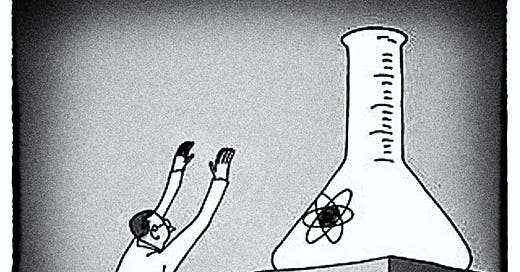






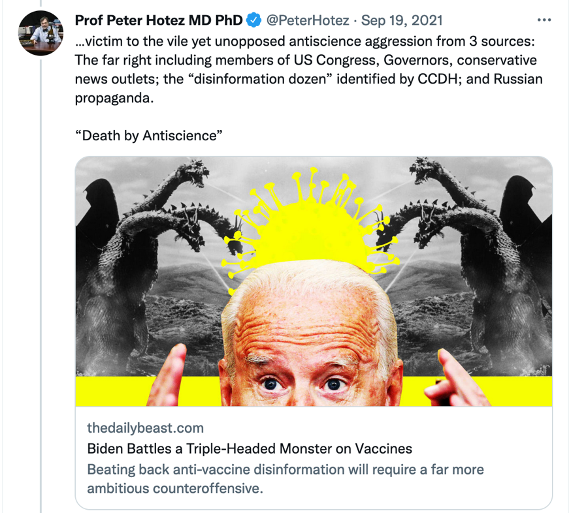
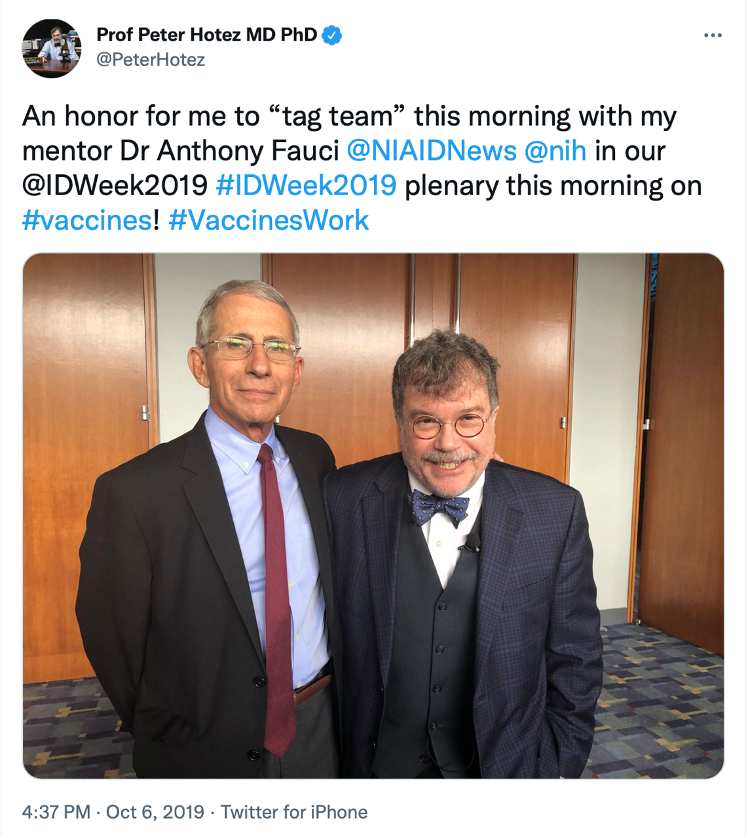

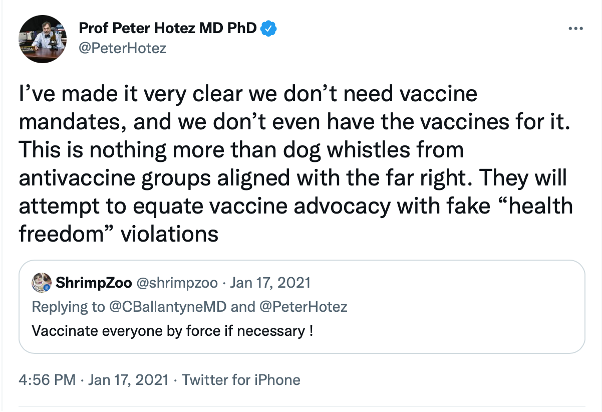




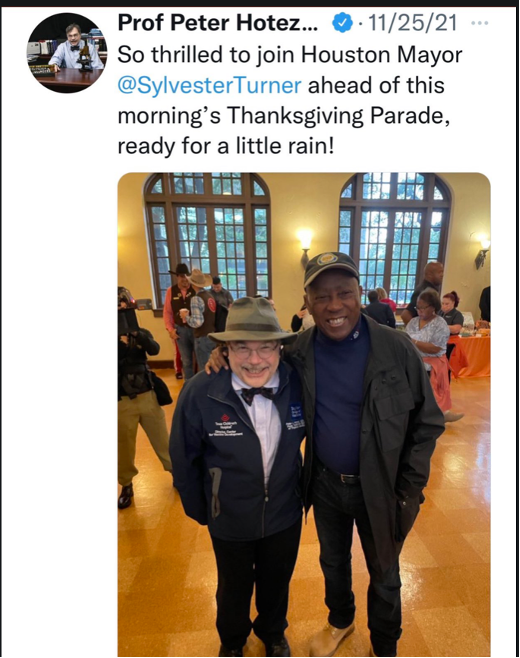





One of the most jarring things I’ve observed during the pandemic is the way in which people with a vested interest in preventing a serious scientific investigation of the pandemic’s origins have managed to manipulate the public and the mainstream corporate press by simply pandering to the “correct” politics. I’ve watched for over two years as people like Hotez, Anthony Fauci, Angela Rasmussen, Peter Daszak, and Kristian Andersen repeatedly took to social media to generate cover for themselves by cynically paying homage to trendy progressive causes – Black Lives Matter, eco-catastrophism, Trump impeachment, the supposed omnipresence of sexism in academia, etc. – as of way of signaling to the mainstream media that, “We’re on your side; now defend us.”
People in their positions came to recognize what is arguably the most important observation about life in the West in the 2020s, which is this: The left won the culture war, and won it decisively, and if you want money, power, and protection from criticism for your misdeeds (usually arising from the pursuit of the first two), you have to be willing to ingratiate yourself to those who hold power. It’s no different from the way the GOP used to performatively grovel before the evangelicals back in the 1980s and 1990s when religion held much more sway in American public life. Hence, when the New York Times and other major news outlets (which are now composed largely of the same typically white, upper-middle-class, college-educated people like Hotez) see this clique of virologists and NIH-associated schmucks decrying a lab leak as a conspiracy theory, they recognize them as confreres and go into full defend-and-promote mode. And because corporate media really *does* have a liberal bias now (in so far as they see liberal posturing as a roadmap to higher profitability), the average person who mistakenly thinks NPR is a middle-of-the-road news organization is left unaware that there are compelling reasons to think a lab leak might, in fact, be the genuine source of the pandemic.
Our culture may have moved on from paying undeserved, unquestioning respect to shibboleths of the Biblical kind, but we’ve simply graduated on to paying the same kind of undeserved deference to anything to which trendy, slapdash terms like “social justice” can be applied. Guys like Hotez understand this, largely because the places in which they work (e.g., academia) have come to demand political allegiance to one very narrow set of ideals. Academia, research institutes, federal funding agencies – these places have become cesspools of ideological conformity. Unfortunately, the lesson young people are being taught in all of this is that if you want to be culturally relevant – e.g., get into college, get a good job, be popular on social media – you, too, must adopt this one very specific set of partisan beliefs, including tacky truisms like “trust the science." This conformity portends something very bad for the future of American scientific research.
Not to forget that in early November 2020 Hotez was still sufficiently anti-science and anti-vax to warn correctly that the Covid shots would not be effective
https://www.medpagetoday.com/infectiousdisease/covid19/89512
Of course, a lot of people were saying this but the story changed as soon as Trump was out of the way, and wouldn’t get the kudos from the roll out.